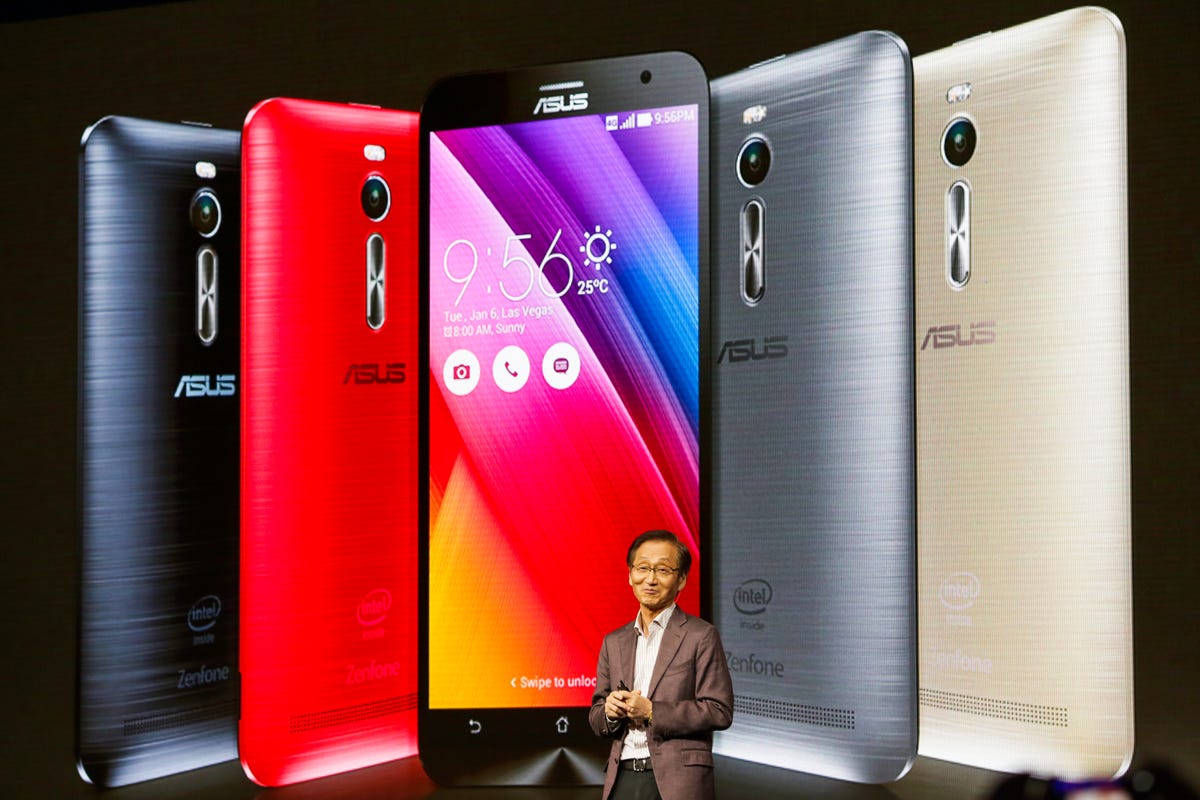
Sarah Tew/CNET
NEW YORK — You may know Asus from its laptop business, but when it comes to smartphones in the US, it’s strictly, “Asus who?”
Asus is the world’s fifth-largest PC manufacturer, but wants to expand its presence in the faster-growing mobile business, where it has a minimal presence in the US. It hopes to change that by pitching attractively priced smartphones directly to customers, tapping into the market of consumers who eschew traditional wireless service contracts.
“We already have a very strong foundation for the rest of the world,” Asus Chairman Jonney Shih said. “I think if we can grab a good portion from the unlocked [market] first, I think that’s already a good start.”
By going after consumers with solid, but affordable products, Asus hopes to build its reputation in the mobile business. From there, he added, Asus plans to expand its relationships with US wireless carriers. “That’s the step-by-step approach,” Shih said.
Shih discussed his company’s US plans in an interview after an event Monday at Gotham Hall, where he announced that Asus will start selling its new flagship ZenFone 2 in the US and Canada on Tuesday. The Intel-powered, 5.5-inch-display smartphone begins at $199 for 16 gigabytes of storage, with a 64GB version priced at $299 — both offered unlocked and contract-free. The phones will sell directly to customers through Amazon.com, Newegg.com, Groupon.com and B&H in the US and NCIX.com and a few other venues in Canada.
The phone was released in both Europe and Asia earlier this year.
Consumers have traditionally relied on their wireless carrier for advice on mobile phones, though that has changed over the past several years with high-end marquee brands like the Apple iPhone and Samsung Galaxy S lines dominating sales. Asus and its ilk are hoping to do the same on the low end by going after savvy, but budget-conscious, consumers willing to look elsewhere than a traditional wireless carrier for their phone. The pitch: You don’t need to shell out big bucks for a high-end smartphone experience.
Taiwan-based Asus isn’t the only company competing in the affordable-smartphone space, where an off-contract phone typically sells for $100 to $200. Chinese device makers ZTE, Huawei and Alcatel are also working to snag a piece of the US market using similar strategies and price points. All three have also started selling their devices directly to consumers through online stores on Amazon.


Sarah Tew/CNET
Still, the companies are going after a small slice of the market, with a majority of customers buying their phones through their carrier.
Demand for these affordable phones is expected to ramp up as wireless carriers cut back on contract subsidies that can hide the full cost of a premium phone, which runs above $600. For now, the US market is dominated by such top-tier phones, with about 71 percent of US smartphone subscribers owning an Apple or Samsung phone, as of March, according to ComScore. Asus and those three other competitors didn’t reach the top five, which included other premium phone makers LG, Motorola and HTC.
But subsidies obscure the true price of an iPhone 6, which costs $199 under a contract but $650 unlocked. As carriers start to put the onus of paying for the phone on the consumer, companies such as Asus hope the appeal of their product becomes more evident.
Asus’ Shih said his company plans to stand out by providing “the highest luxury at the lowest cost.” The firm plans to do that by cutting back on some areas — such as forgoing an all-metal phone body for a plastic one — and highlighting others — like the ZenFone 2’s powerful Intel processor and 13-megapixel camera.
“You need to do every design tradeoff right,” he said.



